Ground Reports
How The Jashpur Royals Are Driving Ghar Wapsi In Chhattisgarh — Ground Report From Surguja
Sharan Setty
Mar 26, 2024, 06:06 PM | Updated Apr 03, 2024, 02:18 PM IST
Save & read from anywhere!
Bookmark stories for easy access on any device or the Swarajya app.
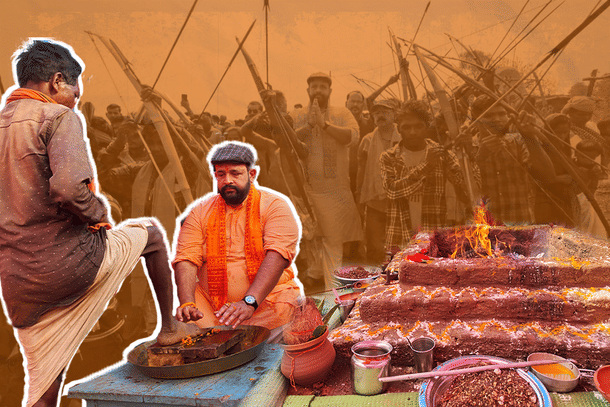
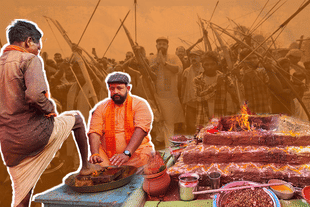
I arrived at Prabal Pratap Singh Judev's house — a member of the royal family of Jashpur and Bharatiya Janata Party's Chhattisgarh state secretary in Raipur's Vidhayak Colony — a Lutyens equivalent.
Their cars, all white, had a BJP flag on the dashboard and carried the royal insignia of the Jashpur family on the door. The interiors were opulent, and signified royalty in every sense of the word. At least a dozen members of his staff attend to all the chores actively.
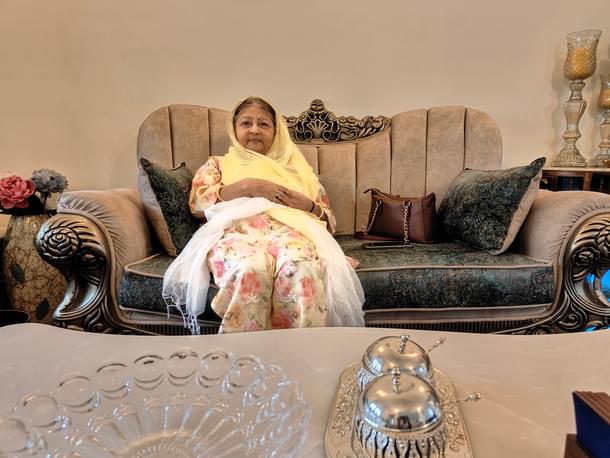
The Jashpur royal family has been holding sway among the tribal communities of Chhattisgarh for the last two centuries, and was one of the first to sign the treaty formally acceding their territory to the Republic of India in 1948.
Their family, particularly Prabal Singh's father, the late Dilip Singh Judev, actively supported the reconversion of tribal Hindus back to their original faith — in other words, ghar wapsi — making him popular among the people and the Sangh parivar too.
But the story has a long history, and I was to explore this with Prabal Judev on our journey to Surguja — a tribal district in northeast Chhattisgarh, nearly eight hours away from Raipur.
Here is how it went —
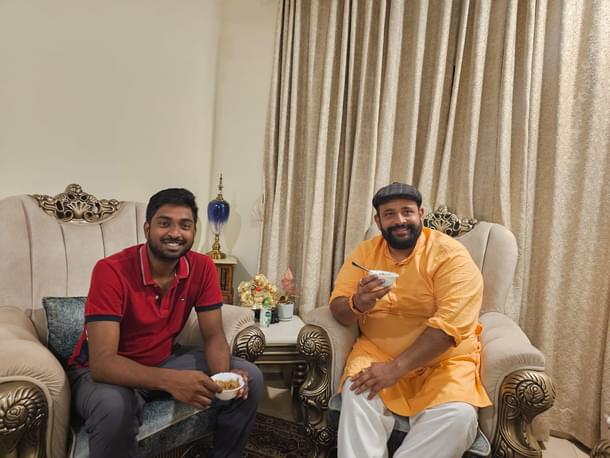
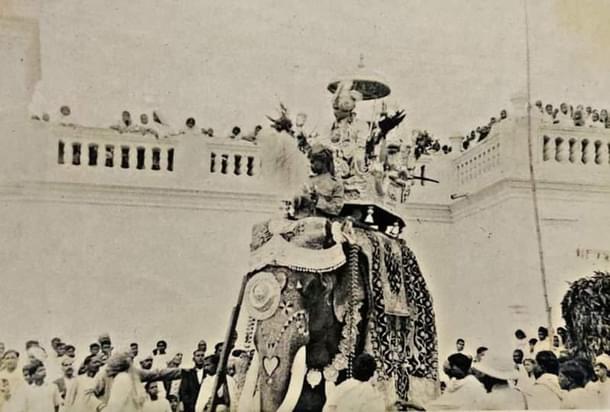
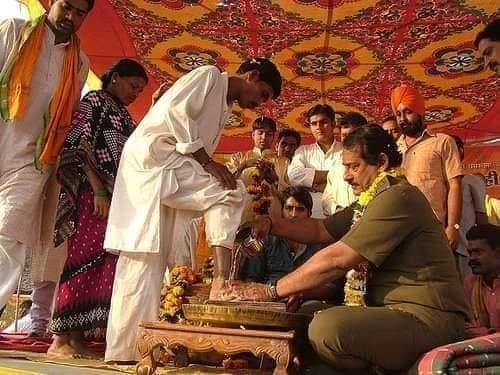
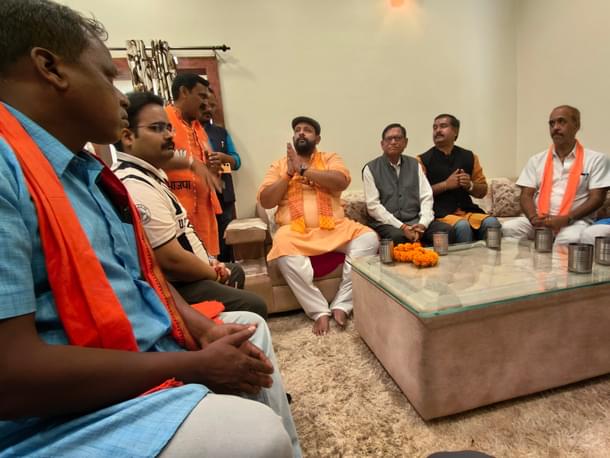
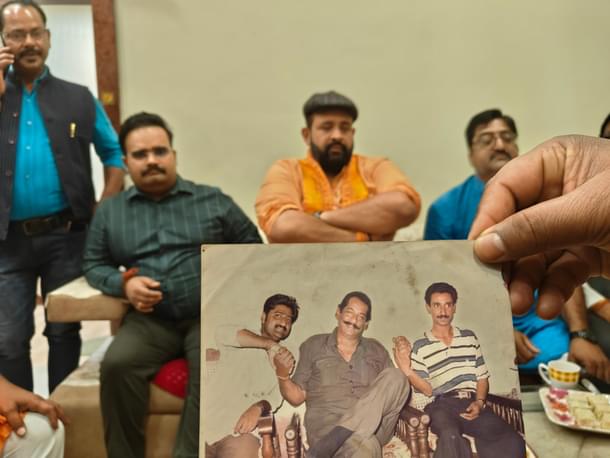
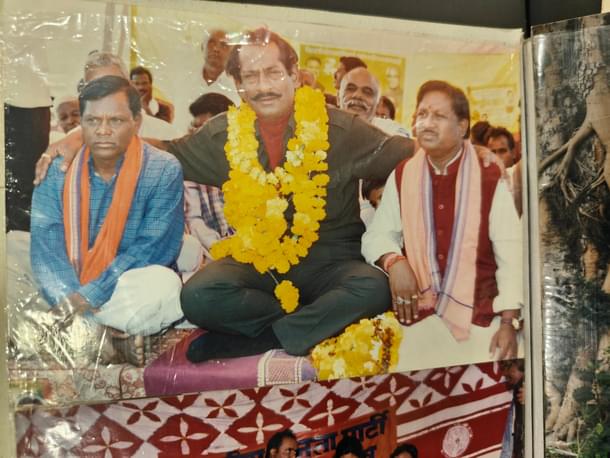
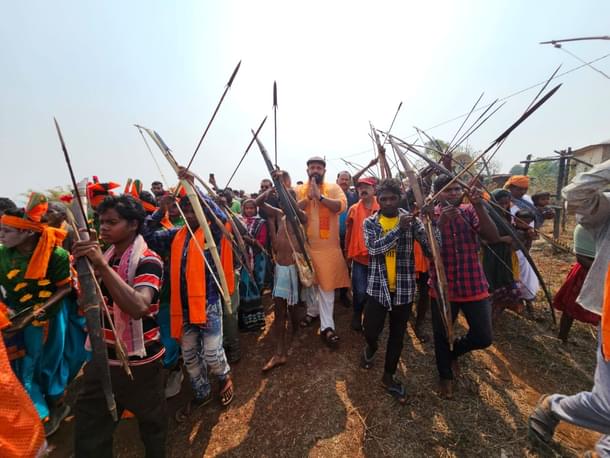
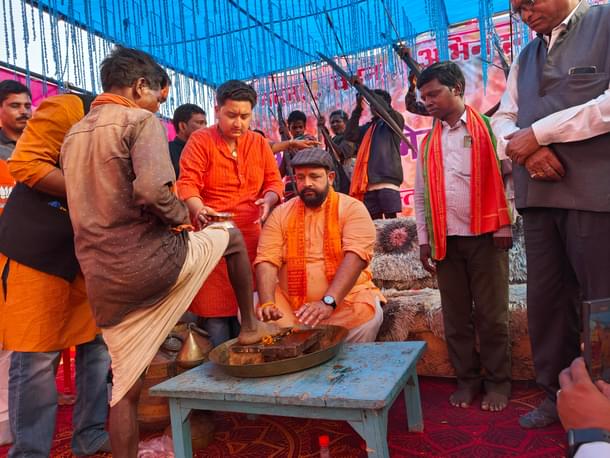
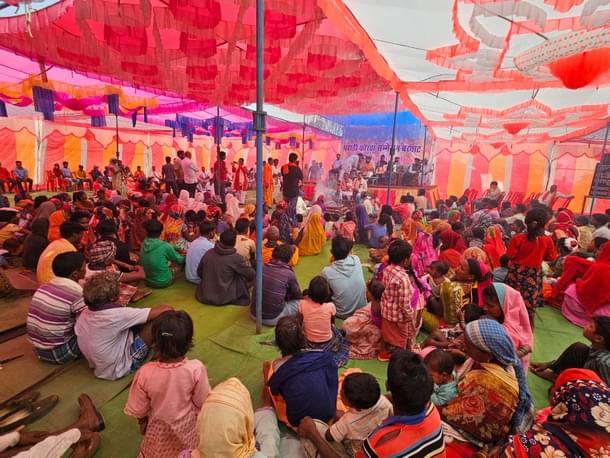
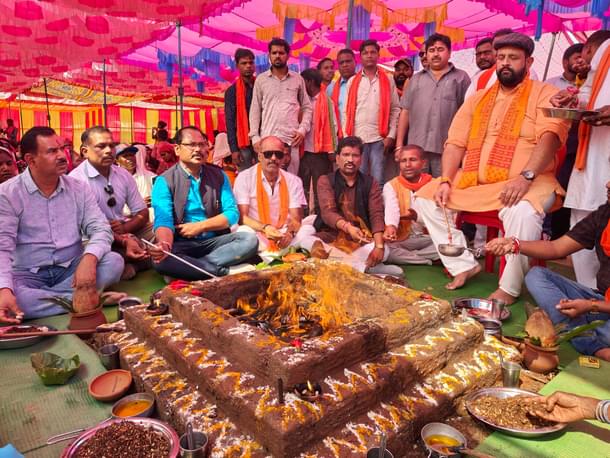
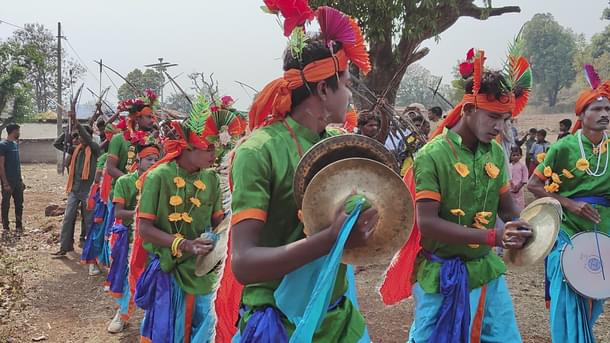
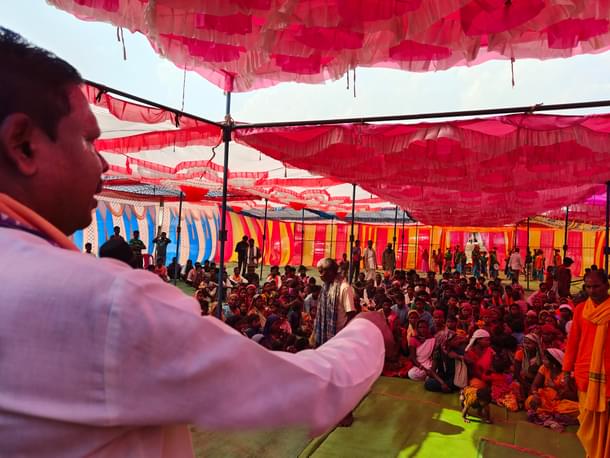
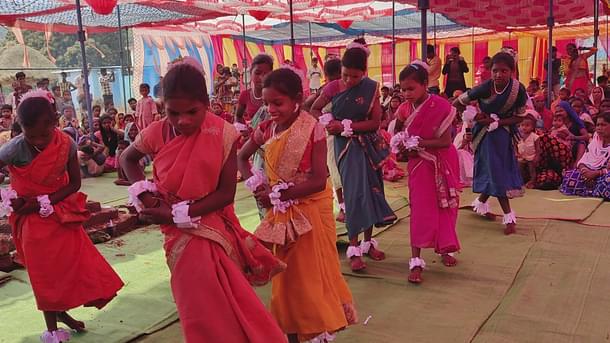
'Yeh Gita, Ganga Aur Gaay Ka Desh Hain'
We left Raipur for Dharamjaigarh, our first pitstop where we could camp for the night, meet some locals and then head to Surguja in the morning.
There was a ghar wapsi ceremony organised by Judev's supporters in the hills of Surguja's Barghat. 56 families of Pahadi Korwas — an endangered tribe listed as a Particularly Vulnerable Tribal Group were to be brought back into the Hindu fold.
Conversions have been a big issue in the area, especially since 2023, the locals suggest. Judev is the one leading the Akhil Bharatiya Ghar Wapsi (ABGW) drive in the state. Similar events, like the one in Barghat, have been held across the state in places like Korba, Durg, Jashpur, Raipur, and other areas of north and northeastern Chhattisgarh.
"Conversions, sometimes forced, have been a big disturbance in Chhattisgarh and surrounding states with big tribal populations. In the past, we have seen conflicts emerging between missionaries, government officials and the native tribes", Judev said, beginning the conversation. He asked me whether it was my first visit to the state. I promptly nodded.
Judeo says that communities are being pitted against each other because when identity is diluted or changed, it leads to an eruption in social cohesion. Here, he is referring to the anti-Christian attacks that took place in Bastar ahead of the polls in the state.
In Narayanpur, tribes who have converted to Christianity are known as 'pivoted tribes'. These pivoted tribes are complaining of discriminatory treatment by other members of the tribes who have held on to their native identity.
According to Judev, the Congress administration under former chief minister Bhupesh Baghel ignored the problem for too long, and the violence may have resulted because of it. The converts have also made statements against the then government for failing to provide security to them and not acting against perpetrators.
Tribals constitute nearly 31 per cent of the population in the state, and 29 seats, out of 90, are reserved in the assembly for them.
The BJP was not very strong in these areas in the early years of the state but has managed to make inroads into tribal belts in not just Chhattisgarh, but also in Rajasthan and Madhya Pradesh. In Chhattisgarh alone, the party won in 17 seats out of the 29 reserved constituencies for tribals.
In Chhattisgarh, Prabal Judev wants to bring back the heritage that was once associated with the tribal communities. He says that the community has lost its ancestral roots as a result of proselytisation by the missionaries.
"Wherever we (Hindus) are in the minority, we have lost that land or there's active conflict. Look at Kashmir, look what is happening in certain states of North East India — all this is due to politics of identity. Even Kandahar had the presence of Sikhs, Buddhists and Hindus, what happened there? Not a single Indic person can be found there", he says, stressing that the minorities are safe where Hindus are in the majority.
He says that India has also lost a lot of its landmass that was a part of its civilisation once upon a time. This includes Pakistan, Afghanistan and Bangladesh which had a strong presence of Hindu population a few centuries ago.
"None of those countries are with us anymore. They have all separated from us and gone on to hunt down minorities in their own countries. What sort of a world are we living in?" he asks. He accuses Congress of cultivating a vote bank over the years and appeasing minorities to make that happen.
"Look at the mess these people have left behind," Prabal Judev exclaims, pointing to the stray cattle that slowed down the vehicle almost every other minute on the highway.
The former government under chief minister Baghel introduced a scheme to protect cattle and provide them safety and shelter. But Prabal Judev says that it has been a big scam and that the cattle are roaming unsafe on the roads.
"Even Modi ji spoke about this ghotala (scam) during his rally in Ambikapur," he adds. He was referring to the Godhan Nyay Yojana launched by the former Congress government.
'Rakht Tilak'
As we reach Dharamjaigarh, a hotel appears out of nowhere. A brand new establishment built by a Sindhi family serves as the only option for visitors to stay. We were to halt there for the night and begin our journey towards Surguja in the morning. Judev was welcomed by his supporters, some young, and some senior — many associates of his late father were present too.
As he kept busy with clicking selfies, a local from the Oraon tribe — Avinash Kumar Ekka — struck a conversation with me and emphasised the importance of ghar wapsi in the region.
Many members of Ekka's family have taken up Christianity, to an extent where he says that everyone assumes Ekkas to be Christians. But that is a misrepresentation of a community that has its roots in the region since millennia, he says.
"My mother's side became a victim to conversions. They were eight daughters and two sons. Only my mother and my aunt are still Hindus. Rest of them have converted to Christianity."
"So why are you still a Hindu", Judev asks, before I could even frame a question for Ekka.
"Aastha ki wajah se convert nahi hua. I have been holding on to my roots because of the traditions that I learnt from my childhood", Ekka replied. Another old acquaintance of the Judevs, Ramesh Chanani, enthusiastically mentioned that the rajas in 'their time' used to be greeted with a rakht tilak.
"No one received a rakht tilak, only my father did. That was the extent of his popularity," Judev said in support of his acquaintance. A rakht tilak is when a local would inflict a cut on their thumb and apply tilak to Judev with the blood that would come out.
Chants of Jai Judev, Jai Shri Ram, Jai Jhulelal followed.
'Why Haven't You Converted?'
Next morning, on the way to Kapu, a small town near Ambikapur, Prabal Judev makes a quick pitstop at a house of his father's close acquaintance. People welcome Judev by raising slogans in his support.
"Chhattisgarh ka ek hi dev, Jai Judev, Jai Judev."
"Sabse bada fakeer hain, Chhattisgarh ka veer hain."
"Raju bhaiya Amar rahe."
We walked past the waiting area towards the living room. His supporters, nearly a dozen or more were packed in a small room filled with old photos of Dilip Judev and his close associate Raju. In the photos were a range of senior BJP leaders, including Sushma Swaraj, Rajnath Singh, Vishnu Deo Sai (he was seen standing behind Judev in almost all the photos) and finally, Narendra Modi, when he visited the region to address a rally in 2013.
"Mark Tully ji bhi aaye the yahan," a local recalls the famous British Broadcasting Corporation (BBC) journalist visiting the region on one of his trips to the state. Judev touches the portrait of Raju ji and whispers "Charansparsh, Raju bhaiya, aapke bina hum kya hain?" — "what are we without you, Raju bhaiya?".
He then interacts with the family, his supporters, and some media persons from local establishments who have been anxiously setting up their cameras and connecting the microphone's chord to them. The reporter asks him about a few issues — "why aren't tribals who got converted delisted from getting reservations?", "what are the benefits janjatis are going to get from the Vishnu Sai Deo government?".
Judev answers them one by one, and says that converts to Christianity do need to be delisted from obtaining benefits of reservation. People nod in agreement.
Two of Judev senior's associates recreate a pose with the junior. They are all nostalgic. They are happy that Dilip Judev's son is continuing the legacy of his father who was respected by the locals till his last breath.
'Dhirubhai Ambani Admired Pitaji'
After a quick sip of tea and complimentary greetings, Judev's convoy resumes the journey towards Barghat — a hamlet near the hill station of Mainpat in Surguja. It is about two hours away from Dharamjaigarh town, and the road is bumpy in the first half. We pass through beautiful landscape with tall trees and dried grasslands. The second half of the journey is through the hills, with gravel roads and deep curves at certain intersections.
I wanted to know more about Dilip Judev. He tells about his father's persona and charm that won over masses and classes alike. He had the unique ability to connect with the political elite, and he also had the empathy and knowledge to understand what the poorest tribal in the jungle was suffering from.
"He was something else," Judev says, brushing his beard and adjusting his beret, which is inseparable from him. With his index and thumb, he pushes his aviators up and positions them properly.
"He had a god gifted energy. He was passionate about dharma, and people loved him for that. He encouraged them with his words of wisdom and led by example. He always chose the tough path and avoided taking easy ones. He had a great sense of humour, and had the ability to crack anyone up or lighten the moment when necessary," he says, describing his father fondly.
Dilip Judev had a handlebar moustache, adding to his imperial look. Prabal Judev says that the senior was always very accessible, and in a husky voice, would ask people "aur kya chal raha hain?" — enough to demand respect, but falling short of intimidating them.
I picked his brains a little more. I asked him what Judev's vision was.
"My father dreamed of clean Ganges. He always told me 'Beta, Ganga Ma ki punarutthan hona chahiye'. He also wanted to convert at least one lakh pivoted tribes back into Hinduism. He began nearly four decades ago, and I believe he was very successful at it," he says, beaming with pride.
According to Judev, his father started ghar wapsi programmes because of what he saw — massive conversions led by Christian missionaries in the region.
They would allegedly approach people by promising them healthcare and education benefits, and slowly begin to persuade them into converting to Christianity. There were misunderstandings between the families and communities as a result of it. People began fighting among themselves.
"The only way he (Judev) could deal with this problem was to reconnect them with their roots by performing ghar wapsi, but with a lot of respect. He chose to wash their feet as a mark of respect to them. The janjatis felt touched," he adds.
Judev was very fond of sher-o-shayari, and he would often use them at rallies and interactions with political leaders to win them over. Prabal Judev recalls fond memories of his father's love for poetry that he shared with former prime minister Atal Bihari Vajpayee.
Judev even served as a minister of state for forest, environment and climate change in his cabinet during the NDA government.
Judev senior took Prabal along when he was a kid in Class VIII or IX to meet Dhirubhai Ambani in Mumbai. He remembers that visit very fondly.
"Dhirubhai liked my father's work with ghar wapsi. We met Mukesh and Anil too. They had a lot of mutual respect. I remember going to Matoshree to meet Balasaheb Thackeray after that. Balasaheb was exactly the man that everyone describes, he said to my father: 'Oh these missionaries, how dare they convert our tribals? If you need any support, Dilip ji, do let me know. I am always there for you,'" he said.
'President's Duttu Putras'
Barghat is a village inhabited by Pahadi Korwas — a Particularly Vulnerable Tribal Group (PVTG). They reside in Jashpur, Surguja, Balrampur and Korba districts in Chhattisgarh. Their kuladevi is Mata Khudia Rani.
They are considered to be the adopted children of President Droupadi Murmu. Till not too long ago, their living condition was said to be abysmal, with the tribe employing pre-agriculture era technology to grow crops, and with no access to basic amenities like water, electricity, roads and food grains.
As we reach Barghat, a crowd of nearly 100-150 people, including the Korwas, gives Judev a traditional Korwa welcome, with bows and arrows pointed towards the sky and the small band of musicians performing their beats.
The women have pierced nose and ears, and wear ornaments such as aenthi on their hand. The men, few of them, still sport their traditional attire — just a langot under the waist, or a pancha, at most.
Legends have it that the Korwas trace their ancestry to Ram and Sita. During their exile, Ram, Sita and Lakshman were passing by a paddy field. To protect the crop from animals and birds, a mannequin with a bow and arrow was brought to life after Sita requested Ram to do so. This is said to be the first ancestor of the Korwas.
After a minute's walk, we enter the premises of a makeshift structure where a havan is being performed by Pandit Kapil Dev Shastri, an old acquaintance of the Judevs. Shastri has taken the initiative of performing the ghar wapsi puja across many ceremonies organised since 2002. He estimates at least 15,000 people being reconverted so far by the father-son duo.
Shastri was reading the Gayatri Mantra, and ghee was poured into the fire every time he said 'swaaha'. According to Shastri, Gayatri Mantra is the easiest way to introduce someone into Hindu fold once again, so that they can adopt Ram and Krishna's sanskriti.
About 56 Pahadi Korwa families were seated, and Shastri was explaining the meaning of the mantras, why it is important to be Hindus and cited examples of states like Kashmir, Nagaland and Mizoram and said that "janeus can't be worn in our own country because of the conflicts created by conversions".
After a round of speech by the local mukhiya, Shastri and Judev, sarees and dhotis are distributed to the men and women present on the occasion. Chants of "Bharat mata ki jai, gau mata ka paalan kare" are heard and lunch follows the ceremony.
Young Korwa women danced to Nihuri Nihuri, a Nagpuri song by a local artist called Sunaina Kachhap. Everyone admired the women for putting up a splendid performance. Judev then washed the feet of the tribals, one by one, and concluded the ritual by joining his hands together and welcoming them into the Hindu fold once again.
Not everyone present was from the pivoted tribes, some of them were still Hindus, but performing such havans are important, according to Judev and his people, since they keep the community together.
A Korwa local who took part in the ghar wapsi ceremony said that his ancestors got converted, but the children grew up as Hindus because of ghar wapsi. Although they are Hindus now, they continue to hold certain Christian practices, which they want to get done with.
Another man, Lalith Kumar, says that the community of converted Korwas continue to enjoy the benefits of the reservation offered by the government of India because on paper, they are still Hindus. That's why their names are usually Hindu names, but their practices may be not.
"About 10 families in the village got converted. We do not have food or share space with the converted families. It is not acceptable to lose our traditional beliefs and practices," he says, speaking to Swarajya.
Premsai Korwa, head of the village in Barghat, says: "They want to be a part of the Hindu ecosystem. They also feel protected with us. They have always worshipped nature, and have continued to do it in spite of being Christian. They are called Satan worshippers for this by the church people".
Meanwhile, Shastri is wrapping up and finally gets some time to speak to us. He is the Pranth Mantri for Chhattisgarh's Arya Samaj and has been organising ghar wapsi ceremonies since 2002. He says that the goal is to welcome the families with a lot of respect being bestowed upon them.
"They must not feel ignored or disrespected," he says.
"I have performed the ghar wapsi pooja for over 15,000 people with both the Judevs. Our adivasis are in deep sleep (kumbhakaran ki nidra). We must teach them Ram and Krishna's sanskriti. Crypto-Christianity is a big problem here, and we are trying to tackle it," he adds.
Every other day, an assembly termed 'Changaisabha' is organised by the local diocese where most conversion activities happen, locals allege. Shastri recalled climbing a nearby hill for almost four kilometres. Even there, he encountered converted tribals and wondered how the missionaries had reached such remote areas, given that even the locals rarely visited the place.
Judev, while addressing the gathering, promised caste certificates to everyone in the village so that they could obtain the benefits of reservation easily. He spoke about the greatness of Bhagwan Birsa Munda, the tribal revolutionary who rebelled against both the colonial government and faith.
"My father fought against Arjun Singh very bravely (former chief minister of Madhya Pradesh). He never backed away from a tough fight. That time, the Pahadi Korwas stood by his side and made him win. It is not just him, but even Maharana Pratap was helped by the Bhils in his conquests. You are an integral part of our civilisation, and we will all be grateful to you," he said, concluding his speech.
Dilip Judev passed away in 2013, survived by his wife Madhvi Devi and two sons, Prabal Pratap Judev and Yudhvir Judev. Yudhvir was an MLA from the Chandrapur constituency, and he too passed away a few years later.
Yudhvir's wife contested unsuccessfully from the same seat in 2023, while Prabal Judev fought from the Kota assembly constituency — considered one of the toughest seats for the BJP, since they never won from Kota before.
He lost by a small margin, but is confident of bouncing back soon.
This report is part of Swarajya's 50 Ground Stories Project - an attempt to throw light on themes and topics that are often overlooked or looked down. You can support this initiative by sponsoring as little as Rs 2,999/-. Click here for more details.
Sharan Setty (Sharan K A) is an Associate Editor at Swarajya. He tweets at @sharansetty2.





